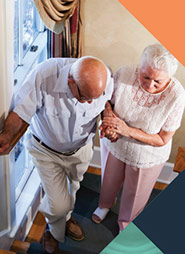Preventing Falls
Falls are a leading cause of injury among older adults. Serious fall injuries such as bone fractures or head trauma can diminish a person’s quality of life or even lead to death. There are simple steps that you can take to lower the risk of falls for yourself or your loved ones.
Optimize Health Care Factors
Participating in activities to improve strength and balance, understanding the side effects of your medications, and getting vision and hearing checks can all reduce the risk of falls. See the document below from the National Council on Aging for more details.
Make Your Home Safe

Look for and correct hazards inside and outside of your home that can lead to trips and falls. Read the Home Fall Prevention Checklist below from the Centers for Disease Control and Prevention for a description of potential risks and safety suggestions.
Home Fall Prevention Checklist
Prevent Falls If You Are a Patient in the Hospital
Falling during a hospital stay is a risk for people of all ages. While you are in the hospital, you may receive treatments that can put you more at risk for a fall compared to when you are at home. These treatments may include medications, the use of medical tubes and equipment, and surgery or other procedures. Being in an unfamiliar environment can also increase your fall risk.
Here are things you can do to protect yourself from falling while in the hospital:
- Use the call bell to ask for help when you need to get out of bed.
- Wait for help before getting up from the bed, toilet, or commode.
- Sit on the side of the bed for a few minutes before getting up. Sit or stand up slowly to prevent getting dizzy.
- Report feelings of dizziness or weakness to your caregiver immediately.
- Wear the non-skid socks provided by your caregiver.
- Be sure the light is on when you are in your room or bathroom.
- Keep your room free of clutter and unnecessary items.
- Ask your caregiver to place your call bell and personal items near you so that they are easy to reach.
- Do not bend over to pick up items that have fallen on the floor – ask your caregiver for help.
- Avoid leaning on items with wheels, such as the IV pole and bedside table.



